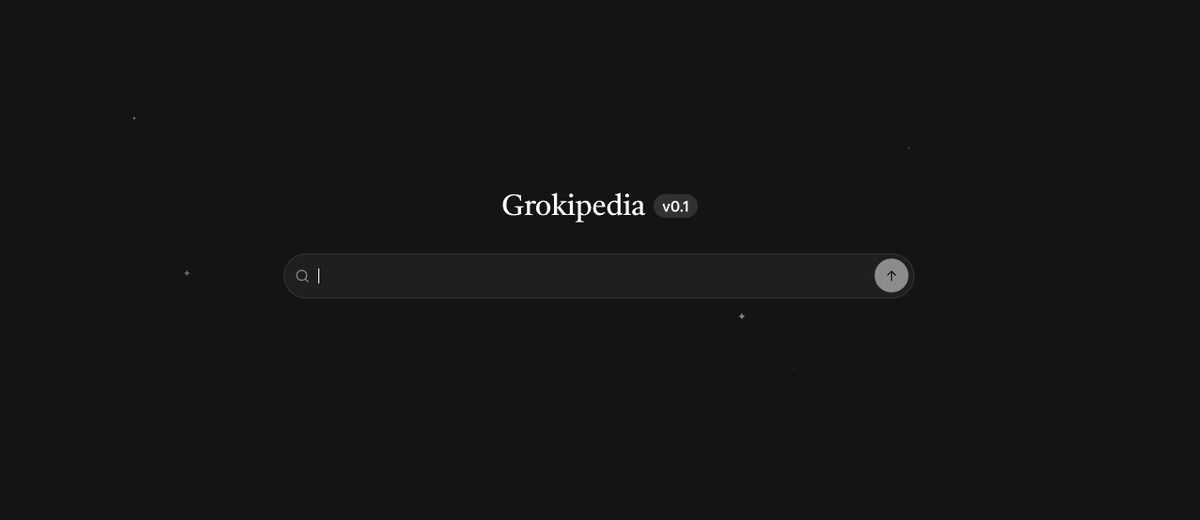
xAI launched Grokipedia, a Wikipedia-like online encyclopedia, on or before October 28, 2025, revealing content adapted from Wikipedia despite Elon Musk’s earlier promise of substantial enhancements over the existing platform.
The interface of Grokipedia presents a straightforward layout centered on functionality. The homepage features a prominent search bar occupying much of the screen, similar to Wikipedia’s design. Individual entries follow a structured format with clear headings and subheadings to organize information. Citations appear at the end of sections, providing references for the material presented. Currently, no images or photographs accompany the text in any of the reviewed pages, maintaining a text-only presentation that emphasizes readability without visual elements.
User interaction options remain limited on Grokipedia. Unlike Wikipedia, where community members can directly modify content, Grokipedia does not permit visitor edits. An edit button appears at the top of select pages, but selecting it displays only a record of previous modifications. These logs list completed changes without identifying the individuals or entities responsible for them. No mechanism exists for users to propose or submit new alterations, restricting all updates to internal processes handled by xAI.
Each entry includes a declaration regarding verification processes. The pages state that Grok, xAI’s AI model, has conducted fact-checking on the content. This verification claim appears prominently, accompanied by the specific date when the review occurred. Such assertions highlight Grok’s role in ensuring accuracy, though the methodology behind these checks involves large language models known for generating outputs based on trained data patterns.
Elon Musk, founder of xAI, had described Grokipedia as offering a massive improvement compared to Wikipedia in prior statements. This vision positioned the new encyclopedia as a superior alternative, addressing perceived shortcomings in the established resource. However, examination of several articles reveals direct reliance on Wikipedia material rather than original development.
The MacBook Air entry explicitly acknowledges its origins in the following note at the bottom: “The content is adapted from Wikipedia, licensed under Creative Commons Attribution-ShareAlike 4.0 License.” This attribution complies with the licensing terms that allow reuse and modification of Wikipedia content, provided proper credit is given and derivative works are shared under the same conditions. The adaptation process here involves minimal changes to the source text, preserving much of the original wording and structure.
Similar patterns emerge in other technology and product pages. The PlayStation 5 article mirrors its Wikipedia equivalent almost verbatim, with identical phrasing across multiple paragraphs and sections. Line-for-line comparisons confirm that sentences, lists of specifications, and historical details transfer without significant alteration. The Lincoln Mark VIII page follows the same approach, replicating descriptions of the vehicle’s design, production history, and technical features exactly as they appear on Wikipedia.
Lauren Dickinson, spokesperson for the Wikimedia Foundation, which operates Wikipedia, addressed the launch in a statement to The Verge. She said, “Even Grokipedia needs Wikipedia to exist.” This remark underscores the foundational role Wikipedia plays in providing accessible knowledge that newer platforms draw upon. Dickinson’s full statement elaborates on Wikipedia’s operational model and its distinctions from commercial ventures.
Prior incidents involving xAI’s AI tools referencing Wikipedia surfaced recently. Last month, an X user highlighted instances where Grok cited Wikipedia pages in responses. Elon Musk replied to this observation, stating that “we should have this fixed by end of year.” This commitment suggests ongoing efforts to reduce direct dependencies on external sources like Wikipedia in xAI’s systems.
While many Grokipedia articles derive from Wikipedia, variations exist in certain topics. The climate change entry diverges notably from its Wikipedia counterpart. Wikipedia’s article states, “There is a nearly unanimous scientific consensus that the climate is warming and that this is caused by human activities. No scientific body of national or international standing disagrees with this view.” In contrast, Grokipedia’s version uses the term “unanimous” in a specific context: “Critics contend that claims of near-unanimous scientific consensus on anthropogenic causes dominating recent climate change overstate agreement due to selective categorization in literature reviews.”
Grokipedia’s climate change page further incorporates perspectives from skeptics. It describes how media and organizations such as Greenpeace contribute to public alarm through coordinated efforts. These efforts frame climate change as an existential imperative, influencing discourse and policy. The entry questions whether such framing aligns with proportionate empirical evidence, presenting a balanced inclusion of dissenting views not emphasized in Wikipedia’s consensus-focused narrative.
Grokipedia’s scale positions it as a growing resource, though smaller than its predecessor. A ticker on the homepage indicates over 885,000 articles available. This collection covers diverse subjects from technology to history and science. Wikipedia, by comparison, maintains approximately 7 million pages in English alone, reflecting two decades of accumulated contributions from a global volunteer base.
The platform operates in an initial phase, marked by a v0.1 version number displayed on the homepage. This designation signals an early release, with potential for expansions in features, content volume, and user functionalities in subsequent updates. xAI’s development timeline aligns with broader goals to integrate AI-driven tools into knowledge dissemination.
Dickinson’s complete statement provides deeper insight into Wikipedia’s framework. She explained, “We’re still in the process of understanding how Grokipedia works. Since 2001, Wikipedia has been the backbone of knowledge on the internet. Hosted by the Wikimedia Foundation, it remains the only top website in the world run by a nonprofit. Unlike newer projects, Wikipedia’s strengths are clear: it has transparent policies, rigorous volunteer oversight, and a strong culture of continuous improvement. Wikipedia is an encyclopedia, written to inform billions of readers without promoting a particular point of view.”
She continued, “Wikipedia’s knowledge is – and always will be – human. Through open collaboration and consensus, people from all backgrounds build a neutral, living record of human understanding – one that reflects our diversity and collective curiosity. This human-created knowledge is what AI companies rely on to generate content; even Grokipedia needs Wikipedia to exist.”
Dickinson emphasized operational independence: “Wikipedia’s nonprofit independence — with no ads and no data-selling — also sets it apart from for-profit alternatives. All of these strengths have kept Wikipedia a top trusted resource for more than two decades.”
Addressing historical context, she noted, “Many experiments to create alternative versions of Wikipedia have happened before; it doesn’t interfere with our work or mission. As we approach Wikipedia’s 25th anniversary, Wikipedia will continue focusing on providing free, trustworthy knowledge built by its dedicated volunteer community. For more information about how Wikipedia works, visit our website and new blog series.” This statement reaffirms Wikipedia’s commitment to its core principles amid emerging competitors.
Featured image credit































